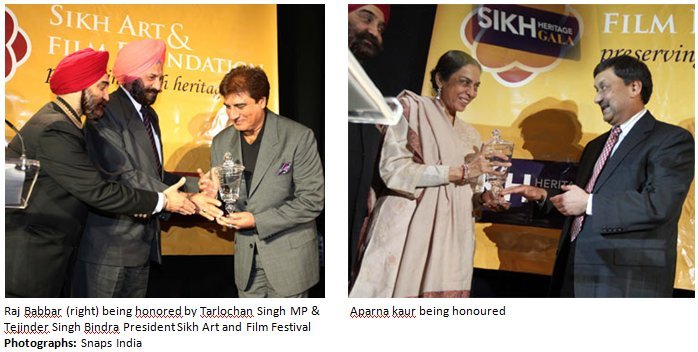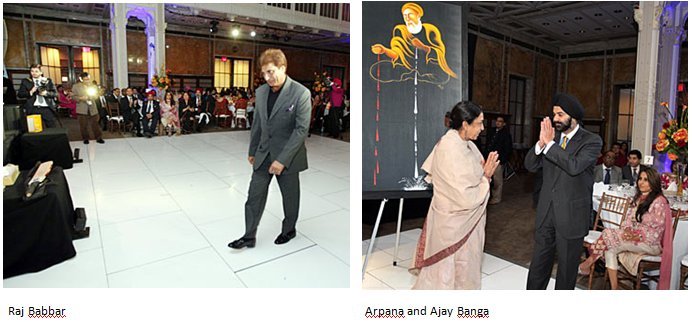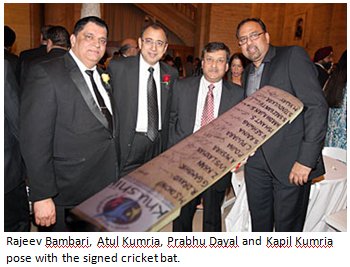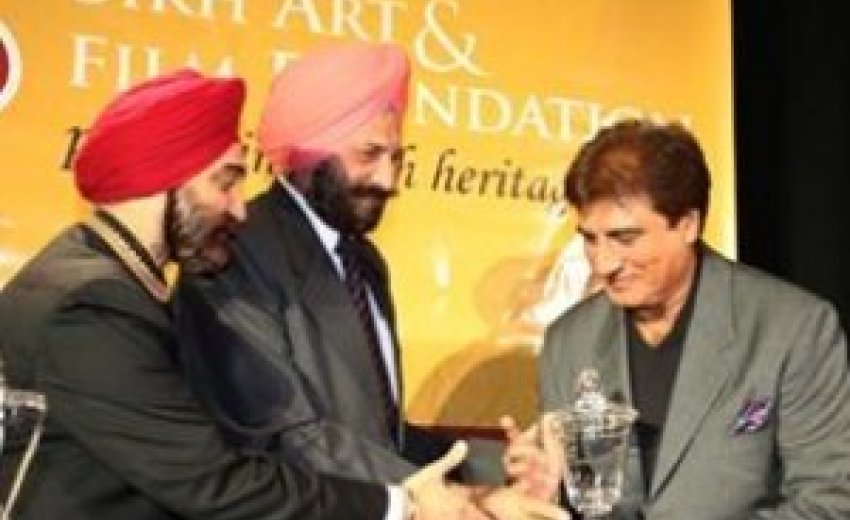 I was in New York helping to judge a Sikh film festival as the sad, comical, annoying drama unfolded of President Obama's aborted upcoming visit to the highest holy shrine of the Sikh religion. The president was supposed to stop at the Golden Temple in India's Punjab state, home of the Sikh faith, while in India next month. But a White House advance team apparently feared if he wore the customary head covering, some might use the image to manufacture another association of him with Islam.
I was in New York helping to judge a Sikh film festival as the sad, comical, annoying drama unfolded of President Obama's aborted upcoming visit to the highest holy shrine of the Sikh religion. The president was supposed to stop at the Golden Temple in India's Punjab state, home of the Sikh faith, while in India next month. But a White House advance team apparently feared if he wore the customary head covering, some might use the image to manufacture another association of him with Islam.
The idea that the American president should be scared of a photo op spoke volumes about how hideously divided we are - and how ill-informed. It hit harder being around hundreds of Sikhs.
Sikhism is a five-century-old religion whose members make up 2 percent of the Indian population. Estimates of Sikhs in America range from as low as 50,000 to as high as 950,000. The U.S. Census doesn't count Sikhs - if it did, I would count as half - but regardless of their numbers, the variety of films emerging from the Sikh diaspora is impressive. I wouldn't have guessed there was even one a year. At the New York festival, now in its seventh year, 13 were screened, out of 35 submissions produced around the world.
Topics ranged from historical to whimsical, from a rebel queen of the 1800s challenging the British empire, to a volunteer effort by young people in Queens to educate their communities about the census. Filmmakers used the media to showcase Sikh contributions and heroes as well as shine a light on their community's practices, good and bad.
Some films raised questions about the Indian government's complicity in a massacre of Sikhs by Hindus in 1984. One decried the environmental waste generated by Sikh temples in America when they use Styrofoam plates to serve free weekly meals. A quirky short touched on the Sikh tradition of keeping hair long and, for men, tucked under a turban.
Sikh hair and its coverings - now presenting problems for Obama - are a particular source of pride and identity. Tragically, after Sept. 11, 2001, they also became the cause of assaults and even assassination of U.S. Sikhs assumed to be Muslims.
A middle-aged woman stood up after a screening, her voice heavy with emotion. The films had made her weep, she said. She'd been in America for many years and raised two sons. One had opted to wear a turban; the other had cut his hair short. The mother accepted both. "I'm begging people, other religious leaders, to respect that," she said.
I felt her pain, and a broader one. If Sikhs find these reckonings with identity tough, how must Muslims feel? That was the real offense of what Juan Williams said on Fox News that got him booted off NPR: When he saw Muslims in Muslim garb, he feared them because they were identifying themselves "first and foremost" as Muslims.
Every culture has the right to observe its traditions, including dress. Just because a small minority of Muslims committed terrorist acts shouldn't put an entire culture - or several - on trial.
Seeing these films drove home the value and the need for each community to tell its own stories, and not let others' perceptions define it. It was a message underscored by Raj Babbar, an Indian actor and member of the Indian Parliament. He recalled that at one time, the only movie depictions of Sikhs were as comical characters to be mocked, and he refused to play them. "Very little has been told about Sikhs by Sikhs," he said.
That's changing - and in ways that could unite rather than divide communities. The subject of the short documentary we chose to win could have been from any group. "Nothing is Impossible" chronicles a 99-year-old marathon runner and title-holder who turned childhood sickness and personal grief into a passion for running. It was funny, inspiring - and universal. But without a Sikh film festival, we may never have known of him.
Further Inputs: ( http://movies.rediff.com/slide-show/2010/oct/27/slide-show-1-sikh-intern...)
Arthur J Pais reports from the Sikh International Film Festival and Sikh Heritage Awards Gala.
'There is no film festival like this in India'
The spirit of Ranjit Singh, the last Sikh ruler of Punjab, popularly known as Sher-e-Punjab, seemed to be present at the Sikh Heritage Awards Gala 2010, the final event of the Sikh International Film Festival. The festival ended October 23 in New York.
One of the films in the competition was director Michael Singh's Rebel Queen, the story of Singh's widow pitted against the British Empire. Also, Indian actor and lawmaker Raj Babbar, one of the three honorees at the gala, brought a segment of his 15-part saga of Ranjit Singh made for an Indian TV network.
The gala also honoured Indian entrepreneur Vikramjit Singh Sahney, who through music and videos, is trying to help young girls get better education and prepare for good jobs. He also backs many efforts to improve the condition of women in New Delhi and neighboring regions.
Helping young girls get better education
Artist Aparna Caur, another honouree, was a visible presence at the annual event organised by Sikh Art & Film Foundation. She and her mother Ajeet, an activist and writer, were the subject of a short film, Khanabadosh (Vagabond), which was one of the award-winners.
Directed by Mahvish Rehman, Priya Thuvassery, Swathi Bhattacharaya and Tulika, this is a 22-minutute documentary. Thuvassery says the film 'develops from their trauma of the partition and then moves on to the anti-Sikh massacre, and how each of them chose to express their trauma through their respective media'.
Another award-winning director Nina Duttaroy's Nothing is Impossible offered a lively portrait of Fauja Singh, a 99-year-old long-distance runner. He holds the record for the fastest marathon race time for a runner over 90 years old.
"There is no film festival like this India," said Tarlochan Singh, a member of the Indian Parliament, adding that there were misconceptions about Sikh culture and history in many parts of India.

Nothing is Impossible
The New York festival, which showed films about Sikhs made in India, Spain, the United Kingdom and North America, is in its seventh year. Singh urged the organisers to take it to India.
The auctions at the gala raised over $35,000 towards awards money and subsidising films, said Teji Bindra, president, SAFF.
"We did something special this year," he added. "We gave token cash reimbursement to filmmakers whose films were shown at the festival. Some received $1,500, some $1,000. We gave away over $35,000, including $5,000 each for the editing and post-production of the film Cancer Express, and the work in progress, Riding the Tiger, about the killings of thousands of Sikhs following the murder of Indira Gandhi."

Riding the Tiger
Caur's painting Sacha Sauda (True Business), commissioned for the gala, was auctioned for $16, 500. Bindra said the winning bidder, Ajay Banga, chief executive officer, MasterCard, wanted to send it to half-a-dozen universities across America where Sikh related activities are taking place.
The first destination will be the Harvard Divinity School where the short film Holy Kitchens -- True Business made by chef Vikas Khanna will soon be screened.
 "It was a very big gesture," he added. "Instead of taking the picture to beautify his home, Banga is sending it on a tour. Holy Kitchens traces the tradition of langar, free food given in Sikh temples, which was started by Guru Nanak.
"It was a very big gesture," he added. "Instead of taking the picture to beautify his home, Banga is sending it on a tour. Holy Kitchens traces the tradition of langar, free food given in Sikh temples, which was started by Guru Nanak.
When Nanak was a young man his father gave him money to start a business. Nanak was on his way to a city, but on the way he came across hermits who were hungry. And then there were people who needed money for their food. He spent all the money on them. When he returned home, his father wanted to know about the business venture. The son said, 'I have done sacha sauda'."
Bowled over
Helping raise $11,000 was a ball signed by Kapil Dev and bat signed by an entire cricket team led by Sachin Tendulkar, Bindra said.
"Auctioning the bat was not on our agenda," he added. "Atul Kumria, head, sales (North America), Kingfisher Airlines, came to see me with his brother Kapil. A common friend, Rajiv Bhambri, business head/COO at India Abroad, brought them to my office. Kapil, an India-based entrepreneur, is involved with Khushi, a non-governmental organisation focusing on youth started by former Indian cricketer Kapil Dev."
The Kumria brothers met Bindra to explore the possibility of joining hands in bringing Khushi to America. "As they got up to go at the end of our meeting, Kapil suddenly remembered we were holding an auction and mentioned the bat and the ball," he said. "But we had just about two days to go (for the gala). The two worked superfast in ferrying the bat to New Delhi and then to New York."
The gala, held at the New York Public Library, was attended by over 450 people. "So many people want to attend the gala that we are thinking of a hall that will hold at least 750 people," Bindra concluded.
